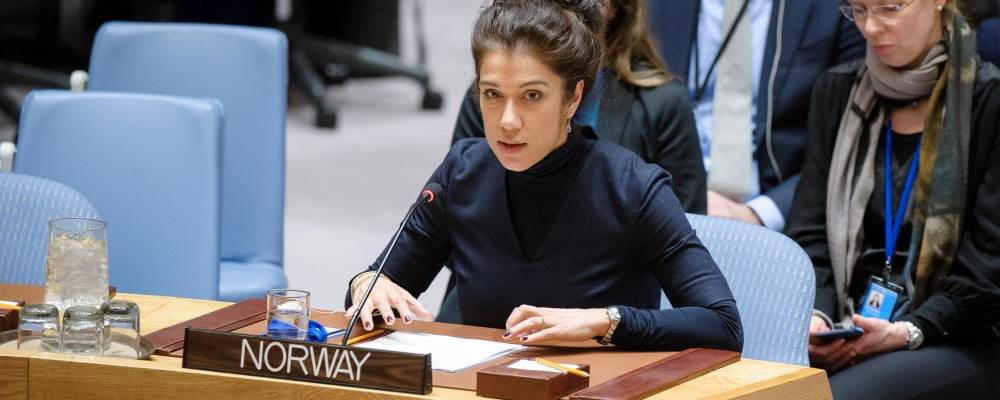(Check against delivery)
Mr. President,
I have the honour of making this statement on behalf of the Nordic countries: Denmark, Finland, Iceland, Sweden, and my own country Norway.
Trafficking in persons, including forced labour and slavery, is a grave violation or abuse of human rights. It also constitutes a serious form of organized crime, sometimes supported by state actors, often with impunity. These criminal networks exploit displaced persons. They have a catalytic effect on migration.
Billions of dollars are generated each year – money that fuels conflict and terrorism and hampers development.
Women and children are particularly exposed to trafficking, often in the form of sexual slavery, forced labor or as child soldiers.
For terrorist groups like ISIL/Daesh, Boko Haram and Al-Qaeda, trafficking and slavery create lasting harm to individuals and are tools used to humiliate and terrorize populations and to raise money for their operations.
Children in armed conflict need to be protected also from trafficking and exploitation. International law need to be respected and parties to conflict need to take their responsibility and take action to protect and address violations and abuses.
The Secretary-General’s report on conflict-related sexual violence confirms that there is an evolving criminal infrastructure designed to exploit refugees and migrants through human trafficking, and sexual slavery.
Mr. President,
International organizations and instruments such as the ‘UN Convention against transnational organized crime’ must be utilized better and more effectively to ensure effective international cooperation across borders and regions.
As trafficking in persons and armed conflicts are converging and becoming global security challenges, we need to develop combined tools from the security and development communities. These threats are both causes and effects of conflict.
We need to improve the conflict analyses and cooperation through data sharing and monitoring between countries and across UN entities. We welcome Secretary-General Guterres’ initiative to strengthen the UN’s conflict and threat analysis in this regard.
We also need better gender disaggregated data and documentation in order to develop effective responses and services for female and male victims of sexual exploitation. Trafficking has a clear gender dimension, which also is recognized in Security Council resolution 2331.
The 2030 Agenda gives us an important platform to tackle trafficking in a more holistic manner. SDG 16 on peaceful societies specifically calls for the end of abuse, exploitation, trafficking and all forms of violence against and torture of children. Implementation of the women, peace and security agenda brings women’s voices and experience to the table. Again, the peace, security and development architecture need to be coherent and mutually supportive.
The Nordic countries are strongly committed to tackling all forms of trafficking and organized crime. We are already deeply engaged in anti-trafficking programs, in partnership with developing countries and regional organizations. We believe that strengthening multilateral cooperation and partnerships even more are important measures to take.
In line with Security Council resolutions 1325 and 2250, we also need to engage more women and young people in both peace building activities and actions against human trafficking.
Thank you, Mr. President.
